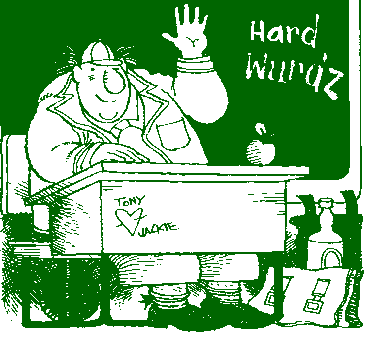 When ordering whisky by phone, it helpsto have a well developed uvular fricative. Pardon? I thoughtyou'd ask.
When ordering whisky by phone, it helpsto have a well developed uvular fricative. Pardon? I thoughtyou'd ask.  When ordering whisky by phone, it helpsto have a well developed uvular fricative. Pardon? I thoughtyou'd ask.
When ordering whisky by phone, it helpsto have a well developed uvular fricative. Pardon? I thoughtyou'd ask.
We are not talking here about rude bits, merely phonetics."Uvular" means a sound produced by vibrating thatstrange conical flap above the back of the tongue:"fricative" means that the breath has been forcedthrough a narrow opening. The uvular fricative gives us theScottish "ch" sound, as in the famous test-phrase thatschoolkids north of the Border have always used to prove theirnationality: "It's a braw bricht moonlicht nicht the nicht,och aye."
If you have a good uvular fricative, there are many maltwhiskies you can order from The Vaults, by phone, withoutsuffering embarrassment or misunderstanding. Auchentoshan,Glenfiddich, Caperdonich, Craigellachie, Benromach, Balmenach,Bladnoch, Glenlochy, Glentauchers... At the last count, with morethan 100 whiskies bottled by the Society in its first decade,nearly a quarter of them involve getting your tongue around theold uv. fric.
But that's not all. It's clear that we live in times ofsophisticated marketing, when legions of highly-paid consultantswill spend months trying to decide on a name for a new car, or anew lipstick shade. They will endlessly test these names onpanels of punters, looking for feelgood responses and weeding outnegative word-associations. This is why you don't get a new modelof family saloon called the "Rusticator", or a newlipstick called "Puking Pink". But whatever name ischosen, you can be sure that it's never difficult to say.
You'll not have failed to notice, though, that malt whisky istoo long in the tooth, too honoured in its traditions, to succumbto such slick and namby-pamby notions. Malt whisky seems to takethe exact opposite course, and you might even have come to theconclusion that if you can't pronounce it, it's bound to be acracker. Can you think of another product of internationalstanding which resolutely stays 50 percent unpronounceable,defying potential customers to place an order?
Some of these names are covered by arcane, one-off rules ofpronunciation. For example, there's one malt whisky which seemsto involve the dreaded uvular fricative but doesn't, and anotherwhich doesn't seem to involve it but does. Glen Garioch, theeastern malt (distillery now closed) is pronounced "GlenGeerie" while Glenglassaugh from Banffshire (distillerymothballed) sounds like "Glenglassoch". You couldalmost say:
Glenglassaugh and Glen Garioch
Both sound distinctly eerioch...
Let us, though, pass on from the uv. fric. and tackle theGaelic. If you're from outside Scotland and have trouble with theGaelic it might be a comfort to know that 95 per cent of us wholive here are in exactly the same position. However, the reasonwhy so many malt distilleries have Gaelic names is that the Gaelswere there first. So it's only fair after all: these are theirplace-names, and some of them are deeply poetic.
Allt-a' Bhainne is "the milk burn". Bruichladdich is"the bank on the shore". Dailuaine is the "thegreen meadow". Tomatin is the "juniper hillock".Caol Ila is the "Sound of Islay", the narrow waterwaybetween Islay and Jura where the distillery stands. These namesare too lovely to mangle carelessly.
But some of them, admittedly, are pretty daunting tofirst-time pronouncers. At this end of the phone, we in TheVaults have been bemused by some of your efforts, although we'realways prepared to give marks for a good try. We have heardClynelish pronounced to rhyme with hellish, and Mosstowie torhyme with gooey. We have heard more versions of Laphroaig thanthere are barley grains in its malt bins. So here's a pronouncingguide to some of the trickier names, with the syllables youshould emphasise give in italics. And may you order with renewedconfidence.
| Allt-a' Bhainne | ... | alta vanya |
| Bruichladdich | ... | brewich laddie |
| Bunnahabhain | ... | boona hahven |
| Caol Ila | ... | cal eela |
| Clynelish | ... | cline leash |
| Dailuaine | ... | dall oo-anga |
| Glenmorangie | ... | glen morrangey |
| Knockando | ... | nock andoe |
| Laphroaig | ... | le froig |
| Tamnavulin | ... | tamna voolin |
| Teaninich | ... | tee annin ich |
| Tomatin | ... | te mahtin |
*With thanks for guidance to Raghnall MacilleDhuibh, ofthe School of Scottish Studies, University of Edinburgh: anyinaccuracies being mine alone.
Anthony Troon
If you have comments about thissite, please contact the